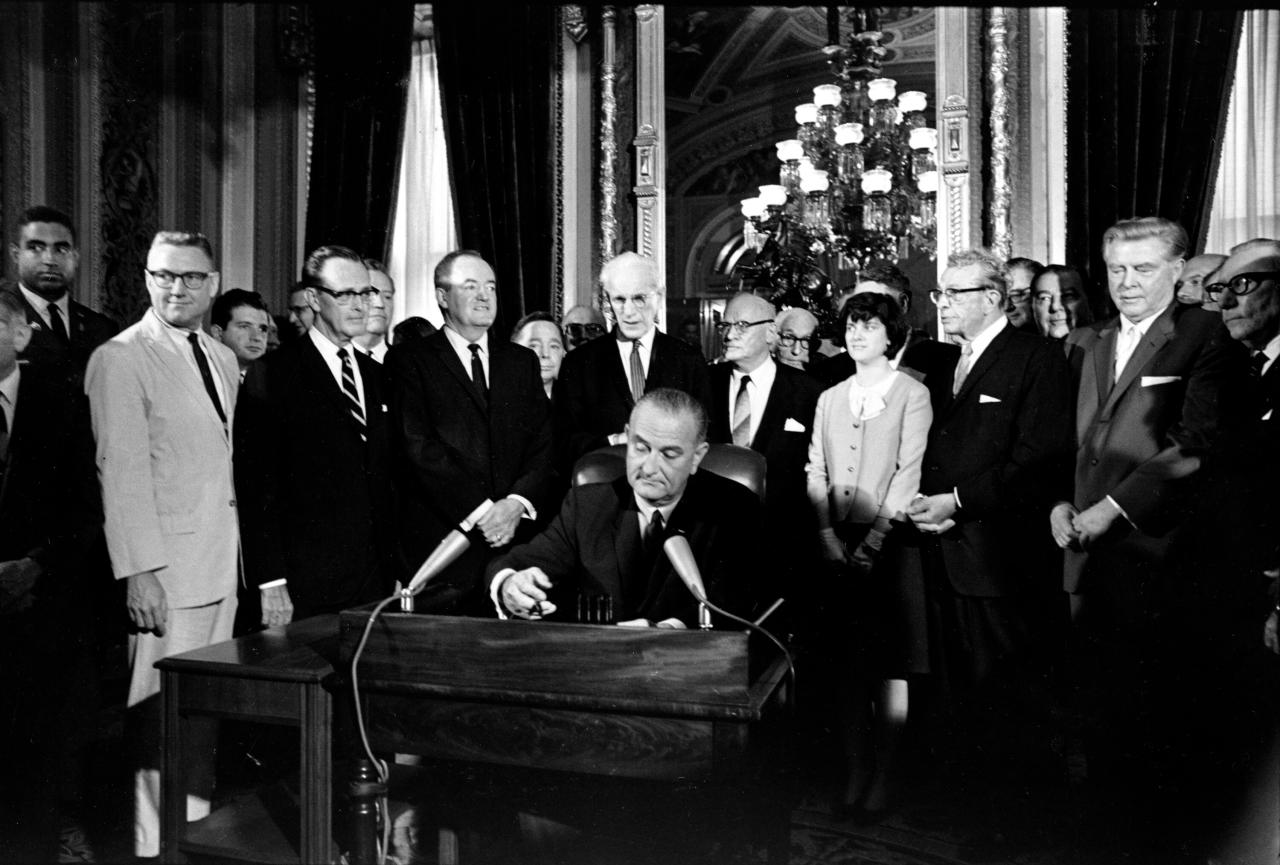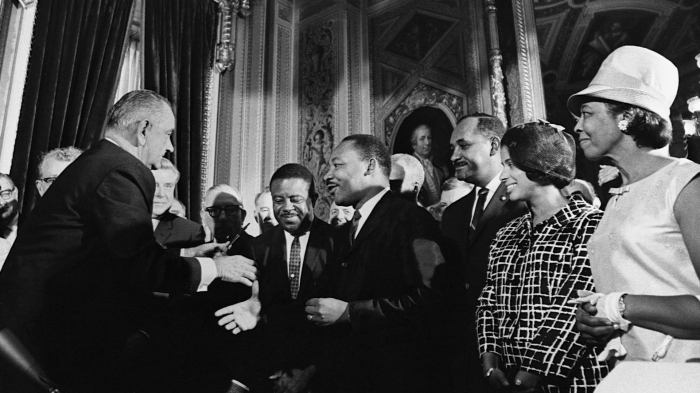Voting rights act of 1965 apush – The Voting Rights Act of 1965 (VRA) stands as a seminal piece of legislation in the annals of American history, marking a watershed moment in the struggle for civil rights. This comprehensive statute, enacted during the height of the Civil Rights Movement, played a pivotal role in dismantling discriminatory practices that had long disenfranchised African Americans in the United States.
The VRA’s passage was a testament to the tireless efforts of civil rights activists and the unwavering determination of President Lyndon B. Johnson. Its provisions, including the prohibition of poll taxes, literacy tests, and other barriers to voting, aimed to dismantle the systemic racism that had permeated the electoral process in the South.
Historical Context of the Voting Rights Act of 1965

The mid-20th century United States was a time of great social and political change. The Civil Rights Movement, which fought to end racial discrimination and segregation, was gaining momentum. In 1954, the Supreme Court ruled in Brown v. Board of Education that racial segregation in public schools was unconstitutional.
This decision sparked a wave of protests and demonstrations, and the federal government began to take action to enforce the ruling.
One of the most important pieces of legislation passed during this time was the Voting Rights Act of 1965. This law outlawed discriminatory practices that prevented African Americans from voting, such as poll taxes and literacy tests. The Voting Rights Act was a major victory for the Civil Rights Movement, and it helped to ensure that all Americans had the right to vote.
Racial Discrimination in Voting
Before the passage of the Voting Rights Act, African Americans faced widespread discrimination in voting. In the South, states used a variety of methods to prevent African Americans from voting, including poll taxes, literacy tests, and intimidation. These methods were effective in disenfranchising a large number of African Americans.
In 1960, only 2% of African Americans in Mississippi were registered to vote.
The Civil Rights Movement and the Voting Rights Act
The Civil Rights Movement played a major role in the passage of the Voting Rights Act. The movement’s leaders, such as Martin Luther King Jr., John Lewis, and Rosa Parks, organized protests and demonstrations to demand equal rights for African Americans.
These protests and demonstrations helped to raise awareness of the issue of voting discrimination, and they put pressure on Congress to pass legislation to address the problem.
The Voting Rights Act was passed by Congress in 1965. The law outlawed discriminatory practices that prevented African Americans from voting, such as poll taxes and literacy tests. The law also created a system of federal oversight to ensure that states were complying with the law.
The Voting Rights Act was a major victory for the Civil Rights Movement. The law helped to ensure that all Americans had the right to vote, and it marked a turning point in the fight for racial equality.
Provisions of the Voting Rights Act of 1965
The Voting Rights Act of 1965 was a landmark piece of legislation that prohibited racial discrimination in voting. The Act included a number of key provisions, including:
Ban on Poll Taxes
Poll taxes were a fee that voters had to pay in order to vote. These taxes were often used to disenfranchise African Americans, who were disproportionately poor. The Voting Rights Act banned poll taxes in all federal, state, and local elections.
Ban on Literacy Tests
Literacy tests were another method used to disenfranchise African Americans. These tests were often administered in a discriminatory manner, and they were often used to deny African Americans the right to vote. The Voting Rights Act banned literacy tests in all federal, state, and local elections.
Other Discriminatory Practices
The Voting Rights Act also banned a number of other discriminatory practices, such as:
- Denying African Americans the right to register to vote
- Intimidating African Americans who were trying to vote
- Gerrymandering electoral districts to dilute the voting power of African Americans
Enforcement Mechanisms
The Voting Rights Act also established a number of enforcement mechanisms to ensure that the Act was enforced. These mechanisms included:
- Federal oversight of voter registration and voting practices in areas with a history of racial discrimination
- The appointment of federal examiners to oversee voter registration and voting in areas with a history of racial discrimination
- A provision that allowed the Attorney General to bring lawsuits to enforce the Act
Impact of the Voting Rights Act of 1965

The Voting Rights Act of 1965 was a landmark piece of legislation that had a profound impact on American democracy. The act prohibited racial discrimination in voting and established federal oversight of voter registration and elections in areas with a history of discrimination.
The Voting Rights Act has been credited with dramatically increasing voter turnout and the election of minority candidates.
Immediate Impact
The Voting Rights Act had an immediate impact on voter participation. In the 1964 presidential election, only 61% of African Americans of voting age were registered to vote. By 1968, that number had increased to 75%. In the South, where discrimination had been most severe, the increase in African American voter registration was even more dramatic.
In Mississippi, for example, only 6.7% of African Americans were registered to vote in 1964. By 1968, that number had increased to 59.8%.
The Voting Rights Act also led to a sharp increase in the number of African American elected officials. In 1964, there were only 100 African American elected officials in the United States. By 1968, that number had increased to 500.
Long-Term Impact, Voting rights act of 1965 apush
The Voting Rights Act has had a lasting impact on American democracy. It has helped to ensure that all Americans have the right to vote and that their votes are counted. The Voting Rights Act has also helped to increase the diversity of elected officials and to make government more responsive to the needs of all Americans.
The Voting Rights Act is one of the most important pieces of civil rights legislation ever passed. It has helped to make America a more just and democratic society.
Controversies and Criticisms of the Voting Rights Act of 1965: Voting Rights Act Of 1965 Apush

The Voting Rights Act of 1965, while hailed as a landmark civil rights legislation, has not been without its controversies and criticisms. These criticisms primarily revolve around its constitutionality, effectiveness, and potential for abuse.
Constitutionality
Critics argue that certain provisions of the Act, such as the requirement for certain jurisdictions to obtain federal preclearance before making changes to their voting laws, violate the principles of federalism and equal protection under the law. They contend that these provisions unfairly target specific jurisdictions based on their history of discrimination, rather than on current evidence of voting rights violations.
Effectiveness
Another criticism of the Voting Rights Act is its effectiveness in achieving its intended goals. While the Act has undoubtedly expanded voting rights for African Americans and other minority groups, some critics argue that its impact has been overstated. They point to the fact that racial disparities in voter turnout and representation persist, suggesting that the Act has not fully addressed the underlying causes of voter suppression.
Potential for Abuse
Furthermore, there have been concerns about the potential for abuse of the Voting Rights Act. Critics argue that the preclearance requirement has been used to block legitimate changes to voting laws, even in jurisdictions that have made significant progress in eliminating discrimination.
They also raise concerns about the potential for the Act to be used for partisan purposes, as it gives the federal government significant power to intervene in local election laws.
Legal Challenges and Supreme Court Rulings
The Voting Rights Act has faced numerous legal challenges over the years. In 1993, the Supreme Court ruled in Shaw v. Renothat race-based redistricting plans must be narrowly tailored to achieve a compelling government interest. In 2013, the Court struck down Section 4 of the Act in Shelby County v. Holder, ruling that the coverage formula used to determine which jurisdictions were subject to preclearance was unconstitutional.Despite
these challenges, the Voting Rights Act remains a cornerstone of American civil rights law. It has played a crucial role in expanding voting rights for marginalized communities and continues to be a subject of debate and discussion.
Legacy of the Voting Rights Act of 1965
The Voting Rights Act of 1965 stands as a monumental achievement in American history, leaving an enduring legacy that has profoundly shaped the nation’s commitment to civil rights and democratic principles. The Act’s passage marked a watershed moment in the fight for racial equality, dismantling systemic barriers that had long disenfranchised African Americans and other marginalized communities.
Role in Advancing Civil Rights
The Voting Rights Act played a pivotal role in advancing the civil rights movement by ensuring equal access to the ballot box for all citizens. It outlawed discriminatory practices such as literacy tests, poll taxes, and gerrymandering, which had historically been used to suppress the Black vote.
The Act’s passage empowered African Americans to participate fully in the political process, leading to a surge in voter registration and the election of Black candidates at all levels of government.
Impact on American Democracy
The Voting Rights Act has had a profound impact on American democracy by strengthening the foundations of representative government. It has helped to ensure that the voices of all citizens are heard in the political process, regardless of race, ethnicity, or socioeconomic status.
The Act’s provisions have contributed to increased political participation and representation, making American democracy more inclusive and responsive to the needs of its diverse population.
Continuing Relevance
Despite the significant progress made since its enactment, the Voting Rights Act remains critically important in safeguarding the right to vote for all Americans. Ongoing efforts to restrict voting access, such as voter ID laws and purges of voter rolls, highlight the continued need for vigilance in protecting the legacy of the Act.
The Voting Rights Act serves as a constant reminder of the nation’s commitment to ensuring that all citizens have an equal voice in shaping their government and determining their future.
FAQ Insights
What were the key provisions of the Voting Rights Act of 1965?
The VRA prohibited poll taxes, literacy tests, and other discriminatory practices that had been used to disenfranchise African Americans. It also established federal oversight and the appointment of federal examiners to ensure compliance.
What was the impact of the Voting Rights Act of 1965?
The VRA led to a significant increase in voter registration and turnout among African Americans in the South. It also paved the way for the election of minority candidates to local, state, and federal offices.
What are some of the controversies surrounding the Voting Rights Act of 1965?
The VRA has been the subject of ongoing debate and legal challenges, with some arguing that its provisions are no longer necessary and may infringe on states’ rights.